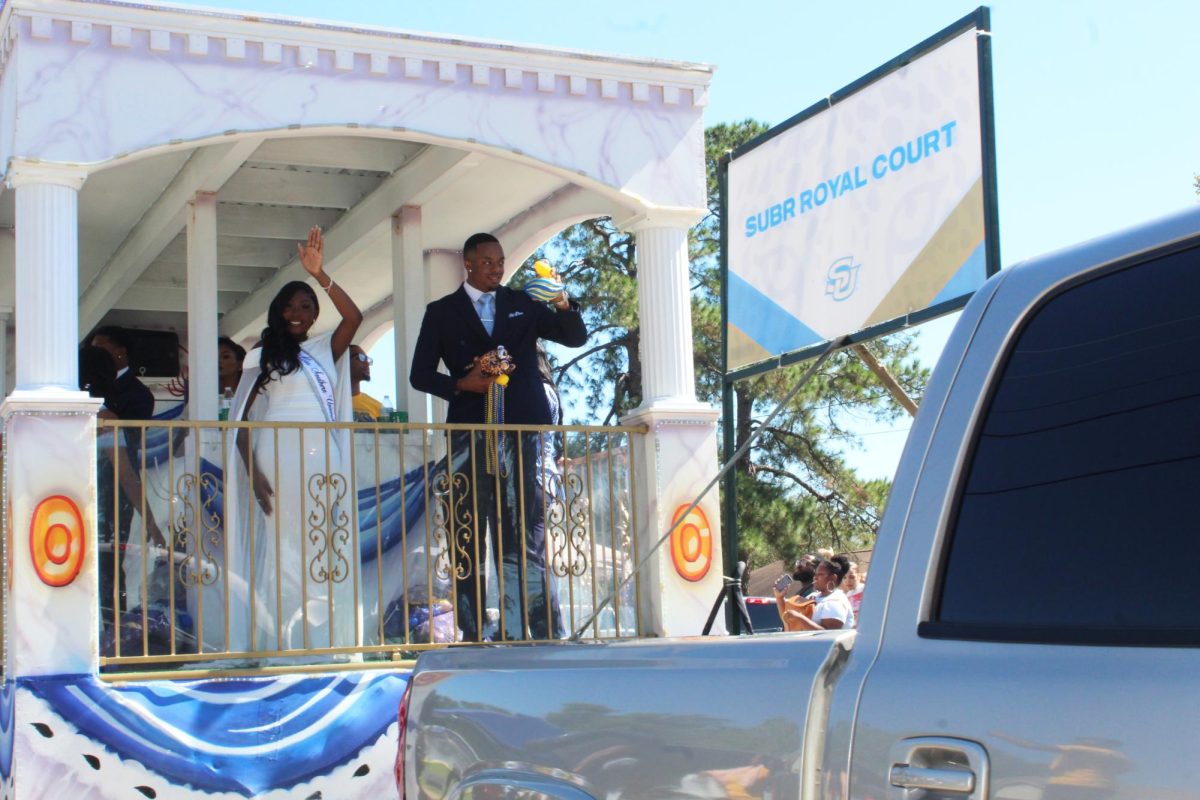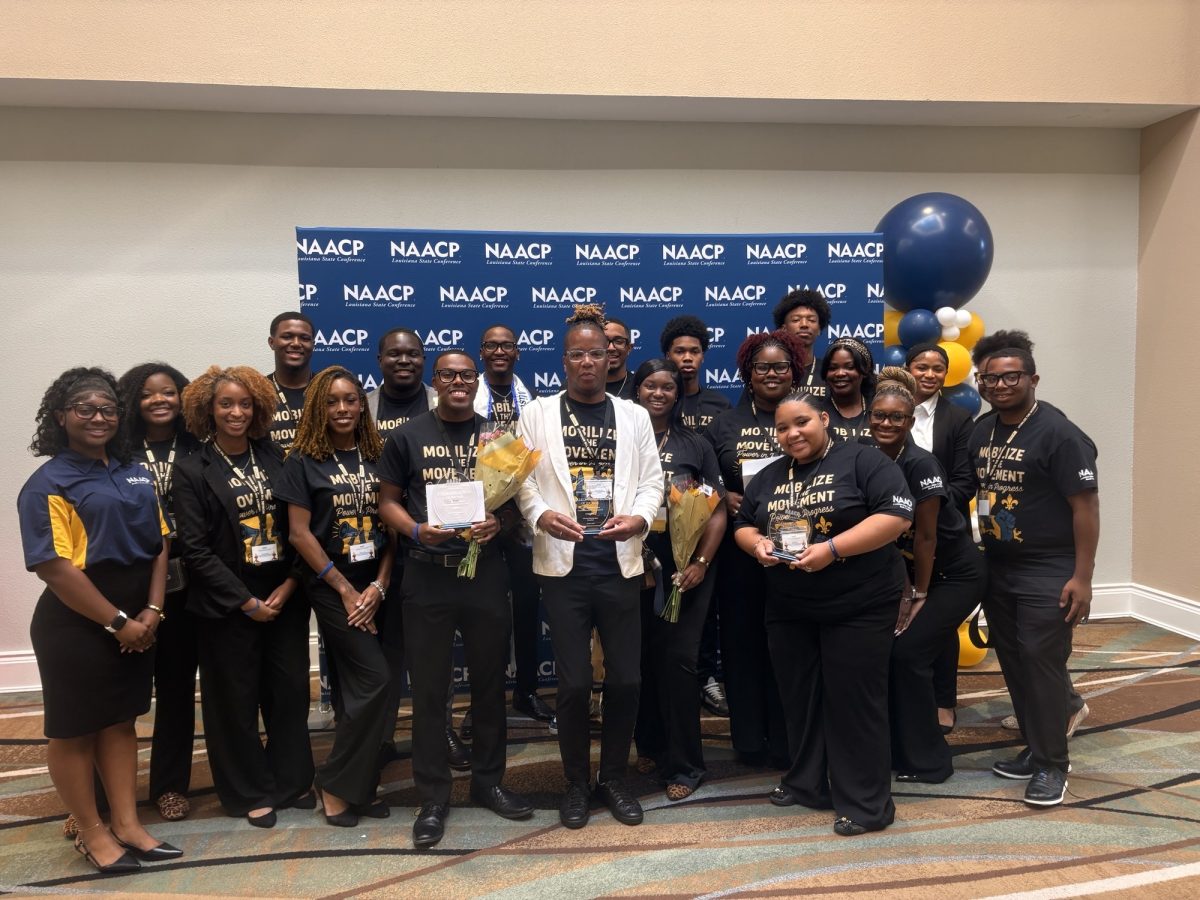As military forces mounted in MiddleEastern deserts two years ago in preparation for the imminent invasion on Iraq,National Guard and Reserve students at college campuses nationwide bracedthemselves and their family members for the call that would alter theircivilian lives and catapult them into the perils of armed conflict.
Many young men and women wereswitched from weekend warrior to active duty status and deployed to the hostilewar zone uncertain of when, or if, they would be returning home.
Now, almost two years after majorcombat operations began in the war known as Operation Iraqi Freedom, many youngsoldiers are returning with stories of heroic and dangerous exploits as theyattempt to readjust to normality and pick up where their lives wereinterrupted. Several SU students were called to duty and a large number of themare back this semester.
Army specialists Shekeitra Lockhartand Jason Matthews of the 285th Engineers, an Army reserve unit in Baton Rouge comprised of of 80 soldiers, were two such students activated justbefore the war.
“My heart stopped,” recalledLockart, a freshman therapeutic recreation major from Baton Rouge, of the newsthat she would be going to war. “Ihad just made 18. When they told me that I would be away from my family in aforeign country, I just couldn’t see it.”
Matthews, a special education majorfrom Clinton, was about to be a father when he received notification of hisdeployment.
“I didn’t know if I was going to seemy child born or not,” he said. “Ireally didn’t know the purpose of the war so I didn’t want to go.”
Neither Matthews nor Lockhartexpected their unit to be called up. Lockhart had just returned from basictraining with plans of starting school.
“I had heard from other members ofmy unit that we were non-deployable, we weren’t going anywhere, it could neverhappen to us,” she said. “That kind of gave me security and comfort.”
Both Matthews and Lockhart weretaken aback by their unit’s call up.
Initially the 285th Unit, was onlyexpected to be gone for six months. However, after months of training andwaiting at Fort Polk in Leesville to deploy and after six months of beingoverseas, members of the unit learned they would be gone for an extra year.
The day the war started, Matthewsand Lockhart found themselves stepping off of a plane onto desert sands. Oncein Iraq, their unit was responsible for building and setting up basefacilities. The 285th carried out missions in places such as Kuwait, the cityof Tikrit which is Sadaam Hussein’s hometown, and Talil.
At the onset of the war, phone callshome were limited, according to Matthews.
“We couldn’t tell (our families)where we were,” he said while explaining the amount of details allowed to begiven over the phone to relatives. “All I could say was ‘Mom, I’m okay, don’tworry about me, I don’t know when you’re going to hear from me again’.” Newsaccess was also limited to the soldiers while they were in the Iraqi desert.
Matthews recalled how slow the mailservice was for the first few months of the deployment.
“I remember three or four weeksgoing by and only getting one letter,” Matthews said. “By the time you did geta letter, it was old news. In the military, mail is very important, especiallywhen you can’t get a phone call.”
Lockhart received a very emotionalletter from her mother during one of the long awaited mail deliveries.
“I remember my mom sending me aletter that made me cry,” she recalled. “When you’re away from somebody,anything they say to you affects you in a different way.”
Violence and the possibility ofdeath remained a lurking threat for the soldiers as they carried out theirdesert duties. One particular incident stuck out in Matthews’ memory. During anice run into the city of Iraq, a mortar round hit the back of a truck that wasbeing driven by one of Matthews’ friends. The round bounced off of the vehicleand killed several bystanders. Matthews was supposed to be the driver of thetruck, but other duties kept him on base.
Aside from the prospect of enemyattack, adverse weather conditions and insects also created a high level ofdiscomfort for the Baton Rouge troops. Lockhart, who admitted to beingextremely afraid of spiders, remembered the intense heat and insect threat.
“They did have scorpions andreptiles,” she said. “It got up to 130 degrees outside. The heat attracted thebugs, and it was hot most of the day.”
For most people, a bath is arelaxing event, but for the soldiers it was not so.
“As far as taking a bath, we usedbottled water,” Matthews remembers. ”It wasn’t a good bath, considering you had fleas on you and you hadbeen outside in the sand sweating all day.”
With all the gloom of the wartimesituation looming over them, Matthews and Lockhart remember several brightmoments during their tour of Iraq. “When you’re in that situation, you just tryto make the best of it,” Lockhart said.
The two recounted their clubexperience while out there, where troops just gathered together after long daysof work and just had fun amongst themselves.
“A lot of times that was moreenjoyable than clubbing in the United States,” Lockhart said. “I guess thatwas, because you appreciated it more.”
The soldiers also had a chance totour the country and visit several historical sights. In an album ofphotographs that captured their experience are pictures of the birthplace ofAbraham, Sadaam Hussein’s palace and the battlefield of Babylon. They also hadan opportunity to ride on the backs of camels while there.
“It was a different experience thatI wouldn’t have experienced otherwise,” Lockhart said.
Matthews and Lockhart share a fondmemory of spending Christmas in Iraq. Cooks from India and Kuwait cooked aspecial meal for all of the troops.
“It was gorgeous,” Matthews said.”They baked some bread shaped like an alligator and had an ice mould.”
In Talil, a safe city located inIraq, allied forces came together to celebrate the season.
“You had the Air Force, Army –everybody was there,” Matthews said. “They all came together and formed a bigchoir. We had a great worship — one of the best worships I’ve ever experiencedwas right there in Iraq.”
For recreation, U.S. soldiers andtroops from different nationalities bonded by participating in a plethora ofsporting activities.
“They had the Korean army, thePorturgese, Italian, Turkish, Hungarian,” Lockhart said. “It was lovely.”
Matthews and a few other SUstudent-soldiers deployed in the region during that time participated in athree-on-three basketball tournament while in Talil. “We were three-on-threechampions of the whole post,” Matthews said. “(We are) right here from BatonRouge.”
Being out of the country tends tohave an affect on soldiers’ lives — sometimes negativelyThe lengthy deploymentsplintered a two-year relationship that Matthews had prior to leaving.
“I advise anybody who goes on adeployment to go single,” Matthews said. “That’s the best way.”
Both Lockhart and Matthews had achance to come home for a two-week leave period over the course of their touroverseas.
“I had more problems at home becauseI was different and I did things different,” Matthews said. “My family didn’tlike that. I was really ready to go back to my friends — I missed them.”
Lockhart shared similar sentimentsabout her leave experience.
“I just couldn’t fall into thegroove of it,” she said. “I would hear people say things like ‘Oh, my TV isbroke’ or ‘My cell phone bill is this and that’ and they just don’t know thatwe’ve been without electricity, televisions, and cell phones. When you witnesspeople living in third-world countries living in huts made of twigs, you haveto ask yourself if these people (in the U.S.)will ever be satisfied.”
Finally, after being gone sinceJanuary 2003, the Baton Rouge soldiers returned home to a hero’s welcome.
“The first thing I did was go see mybaby girl,” recalled Matthews of his first day back. “She didn’t even know me.She didn’t want me to touch her or anything. I sat with her for a while. Then Iate some real food.”
Lockhart got a taste of home bytreating herself to some seafood.
Stepping back on Southern’s campuswas a quite a culture shock for both soldiers as they soon discovered how muchthings had changed since they had been gone.
“Everybody was younger than me,”Matthews said. “The clothes and music were different. I didn’t know who 50 Centwas.”
With this chapter of their livesbehind them and the promise of success in a new semester back in school, bothstudent-soldiers have a wealth of newfound goals and life lessons to share withtheir peers.
“My goal is to get out of school andenjoy myself more,” said Matthews of his new plan for his life.
“With this being behind me now, Irealize I can do anything,” Lockhart said. “Regardless of whatever the circumstance or situation I’min, I can do anything.”





